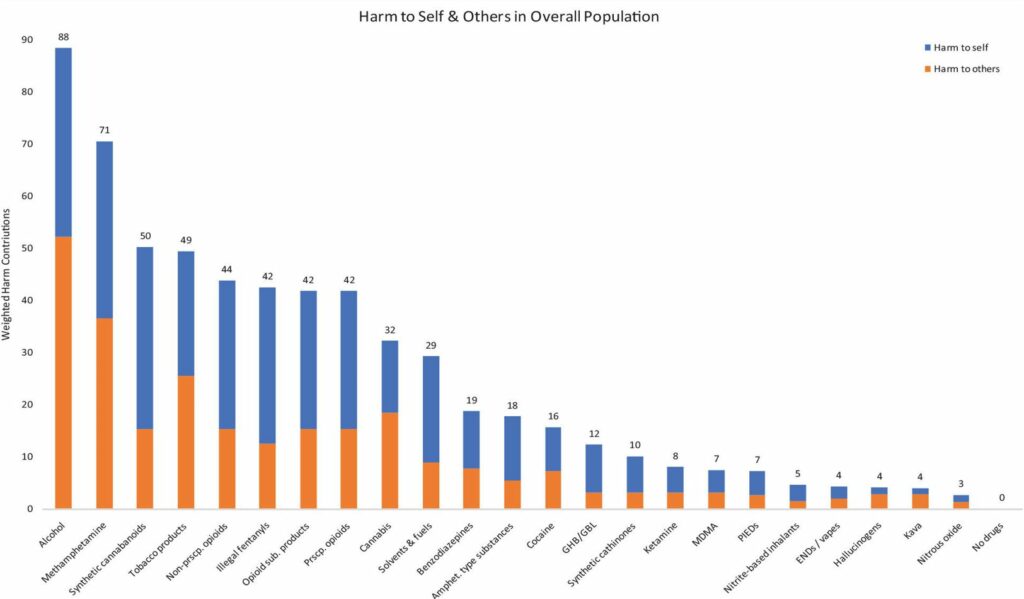One of the Nation’s Favorite Drinks Found to Cause More Harm Than Meth, Synthetic Cannabinoids, and Tobacco – Shocking New Study
Alcohol can be hard to understand when it comes to its risks and possible health benefits. This is reasonable since the evidence for mild alcohol use in healthy people isn’t certain.
Surprisingly little is known regarding the dangers or advantages of moderate alcohol use in healthy persons. Almost all lifestyle studies, including those including nutrition, exercise, caffeine, and alcohol, depend on accurate recall and long-term habit reporting from participants.
These studies might show that two things are linked, but that doesn’t mean that one thing causes the other.
Adults with excellent health may participate in more social activities and drink in moderation, but it’s possible that alcohol has nothing to do with their improved health.
Alcohol may provide a few very tiny advantages that may not apply to everyone. The most recent dietary recommendations explicitly state that no one should start drinking alcohol or increase their alcohol use based only on the possibility of health advantages. For many individuals, avoiding alcohol is the wisest option since the risks are greater than any potential advantages.
However, if you drink lightly to moderately and are in good health, you may definitely keep doing so as long as you do it safely.
According to the experts including Mayoclinic, consuming alcohol in moderation may potentially offer certain health advantages, such as:
- Lowering the odds of heart disease development and related mortality.
- Possibly reducing the risk of ischemic strokes, which are caused by a significant reduction in blood flow due to the narrowing or blocking of arteries leading to the brain.
- Potentially cutting down the risk of diabetes.
Nonetheless, the health dividends reaped from maintaining a nutritious diet and engaging in regular physical activity substantially outweigh the possible benefits of moderate alcohol consumption, and these lifestyle choices have been subjected to more rigorous research.
But be warned: Excessive alcohol consumption has immediate effects that heighten the risk of a variety of detrimental health conditions including cancer, heart disease, stroke, heart attack, brain damage and etc.
But can it be more harmful than methamphetamine, synthetic cannabinoids, and tobacco?
A new study from the University of Otago in Christchurch has found that alcohol, which is legal, hurts New Zealand society more than other illegal drugs.
The study, which appeared in the Journal of Psychopharmacology, indicates that alcohol stands as the most detrimental drug for the entire population, taking into account not only the harm to consumers but also the impact on others. Methamphetamine, synthetic cannabinoids, and tobacco follow alcohol in the ranking.
Other foreign drug harms ranking studies have looked at harm in a general population. This study is thought to be the first to look at and rank the harm of psychoactive drugs in Aotearoa New Zealand for both the general population and for young people individually.
For the purpose of this study, two expert panels comprising professionals from various fields including medicine, psychology, law enforcement, community services, and harm mitigation were established. Through two workshops, they developed distinct rankings of harm for the entire population and for adolescents between the ages of 12 and 17.
The study assessed 23 substances, inclusive of legal drugs like alcohol and tobacco, using a swing weighting procedure against 17 separate harm indicators, and analyzed the data with Multi-Criteria Decision Analysis (MCDA) software. This approach is particularly beneficial in such studies, as it systematically evaluates alternatives and aids in achieving consensus, especially when quantitative data is scarce.
Dr. Rose Crossin, who is affiliated with the Department of Population Health at the campus and co-authored the study, expressed that the results might catch some off guard as they might have presumed illegal drugs to be more harmful compared to the widely-consumed legal substance, alcohol.
“It might challenge people to learn this, but alcohol isn’t the most harmful because it’s the most widely used drug in Aotearoa New Zealand. It’s rated the most harmful because of its association with a huge number of diseases, cancers, psychological disorders and other medical conditions.”
According to the author, Alcohol also harms people’s families, friends, communities, and larger society more than it does individuals who use it. It is linked, for instance, to conditions like fetal alcohol spectrum disorder, which have a detrimental impact on a person’s life, education, and career chances.
“Therefore, we need to improve resourcing for interventions that reduce harm, for those who need them,” adds Dr. Crossin.
The study also highlighted that alcohol and tobacco, the two most commonly used legal drugs in Aotearoa, are responsible for the greatest and fourth greatest overall harm respectively.
Another key observation, pointed out by co-author Professor Joe Boden from the Department of Psychological Medicine, is the discrepancy between the level of harm and the legal classification of drugs.

According to Professor Boden, they observed a varied range of harm among several illegal Class A drugs. He mentions that in certain instances, the legal consequences do not correspond to the actual societal harm induced by these substances.
The study also implies that the drug policies in New Zealand are contributing to the harm.
Professor Boden stated that a notable portion of drug-related harm is attributed to the legal classification of the substance rather than the substance itself. This encompasses harm such as job loss and relationship breakdowns for users, and crime-related and family issues for others.
He suggests “We need to reconsider our policy settings to reduce overall drug harm and consider how best to support family, friends, and communities—not just the actual individual using the drug.”
“When you rank drugs by harm, the evidence supporting drug law reform is compelling,” comments Sarah Helm, NZ Drug Foundation Executive Director.
“This research makes clear that there’s no relationship between legality and lower harm, in fact our laws are causing a lot of the harm. We need to shift towards regulation of substances based on the actual harm they cause.”
Image Credit: Shutterstock
